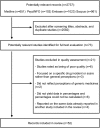Perceptions of generic medication in the general population, doctors and pharmacists: a systematic review
- PMID: 26671954
- PMCID: PMC4679988
- DOI: 10.1136/bmjopen-2015-008915
Perceptions of generic medication in the general population, doctors and pharmacists: a systematic review
Abstract
Objective: To investigate negative perceptions about generic medicines and evaluate the proportions of lay people, doctors and pharmacists who hold these perceptions.
Design: A systematic review of observational studies.
Data sources: MEDLINE, EMBASE, PsycInfo and Scopus.
Eligibility criteria: Quantitative data from cross-sectional and prospective studies published in English after 1980, using self-report measures to evaluate perceptions about generic medicines, presented as percentages of the total sample assessed.
Results: After screening 2737 articles, 52 articles were included in the final analysis. A high proportion of doctors, pharmacists and lay people had negative perceptions of generics. Lay people were significantly more likely to view generics as less effective than branded medication (35.6%, 95% CI 34.8% to 36.4%) compared to doctors (28.7%, 27.5% to 29.9%) and pharmacists (23.6%, 21.2% to 26.2%), p<0.0001. Pharmacists (33.4%, 31.0% to 35.9%) were significantly more likely to believe generics were of inferior quality compared to branded medication than were doctors (28.0%, 26.3% to 29.9%), p=0.0006, and lay people (25.1%, 24.2% to 26.0%), p<0.0001. Doctors believed generics caused more side effects than branded medication (24.4%, 22.2% to 26.9%), compared to pharmacists (17.6%, 15.3% to 20.1%) and lay people (18.8%, 17.8% to 19.8%), p<0.0001. Doctors (28.5%, 26.9% to 30.2%) and pharmacists (25.4%, 21.4% to 29.9%) had significantly more safety concerns about generics than did lay people (18.0%, 17.0% to 19.0%), p ≤ 0.0002. A greater proportion of lay people felt negatively about generic substitution (34.0%, 33.2% to 34.9%), compared to doctors (24.1%, 22.0% to 26.4%) and pharmacists (11.0%, 9.6% to 12.7%), p<0.0001. Rates of negative perceptions of generics do not appear to have changed substantially over time in the general population or among physician groups, p ≥ 0.431, but such negative beliefs show a decreasing trend in pharmacists over the study period, p=0.034.
Conclusions: A significant proportion of doctors, pharmacists and lay people hold negative perceptions of generic medicines. It is likely these attitudes present barriers to the wider use of generics.
Keywords: GENERAL MEDICINE (see Internal Medicine); HEALTH ECONOMICS; PUBLIC HEALTH.
Published by the BMJ Publishing Group Limited. For permission to use (where not already granted under a licence) please go to http://www.bmj.com/company/products-services/rights-and-licensing/
Figures
Similar articles
-
Facilitators and barriers to generic and biosimilar medications in the Middle East and North Africa: insights from physicians and pharmacists-a systematic review.Eur J Clin Pharmacol. 2025 May;81(5):647-665. doi: 10.1007/s00228-025-03819-5. Epub 2025 Mar 14. Eur J Clin Pharmacol. 2025. PMID: 40085198 Free PMC article.
-
A Systematic Review of Physicians' and Pharmacists' Perspectives on Generic Drug Use: What are the Global Challenges?Appl Health Econ Health Policy. 2015 Aug;13 Suppl 1(Suppl 1):S35-45. doi: 10.1007/s40258-014-0145-2. Appl Health Econ Health Policy. 2015. PMID: 25963230 Free PMC article.
-
What Do Users of Generic Medicines Think of Them? A Systematic Review of Consumers' and Patients' Perceptions of, and Experiences with, Generic Medicines.Patient. 2016 Dec;9(6):499-510. doi: 10.1007/s40271-016-0176-x. Patient. 2016. PMID: 27142371
-
What do people really think of generic medicines? A systematic review and critical appraisal of literature on stakeholder perceptions of generic drugs.BMC Med. 2015 Jul 29;13:173. doi: 10.1186/s12916-015-0415-3. BMC Med. 2015. PMID: 26224091 Free PMC article.
-
A rapid and systematic review of the clinical effectiveness and cost-effectiveness of paclitaxel, docetaxel, gemcitabine and vinorelbine in non-small-cell lung cancer.Health Technol Assess. 2001;5(32):1-195. doi: 10.3310/hta5320. Health Technol Assess. 2001. PMID: 12065068
Cited by
-
In vitro performance of cost differentiated ceftriaxone brands against Escherichia coli: insights from a tertiary referral hospital in Mbeya, Tanzania.JAC Antimicrob Resist. 2024 Oct 14;6(5):dlae162. doi: 10.1093/jacamr/dlae162. eCollection 2024 Oct. JAC Antimicrob Resist. 2024. PMID: 39403674 Free PMC article.
-
[Biosimilars and the nocebo effect].Z Rheumatol. 2020 Apr;79(3):267-275. doi: 10.1007/s00393-019-00729-7. Z Rheumatol. 2020. PMID: 31802197 German.
-
Evaluating patients', physicians' and pharmacy professionals' perception and concern regarding generic medicines in Gondar town, northwest Ethiopia: A multi-stakeholder, cross-sectional survey.PLoS One. 2018 Nov 7;13(11):e0204146. doi: 10.1371/journal.pone.0204146. eCollection 2018. PLoS One. 2018. PMID: 30403668 Free PMC article.
-
Strategic behavior and entry deterrence by branded drug firms: the case of authorized generic drugs.Eur J Health Econ. 2025 Jun;26(4):561-575. doi: 10.1007/s10198-024-01721-y. Epub 2024 Sep 24. Eur J Health Econ. 2025. PMID: 39316276
-
Commentary: Beyond 10-year risk: A cost-effectiveness analysis of statins for the primary prevention of cardiovascular disease.Front Cardiovasc Med. 2022 Jul 22;9:916695. doi: 10.3389/fcvm.2022.916695. eCollection 2022. Front Cardiovasc Med. 2022. PMID: 35935628 Free PMC article. No abstract available.
References
-
- World Health Organisation. Trade, foreign policy, diplomacy and health: generic drugs. http://www.who.int/trade/glossary/story034/en/ (accessed 18 Mar 2014).
-
- Alrasheedy AA, Hassali MA, Stewart K et al. . Patient knowledge, perceptions, and acceptance of generic medicines: a comprehensive review of the current literature. Patient Intell 2014;6:1–29.
-
- Dunne S, Shannon B, Dunne C et al. . A review of the differences and similarities between generic drugs and their originator counterparts, including economic benefits associated with usage of generic medicines, using Ireland as a case study. BMC Pharmacol Toxicol 2013;14:1 10.1186/2050-6511-14-1 - DOI - PMC - PubMed
Publication types
MeSH terms
Substances
LinkOut - more resources
Full Text Sources
Other Literature Sources


